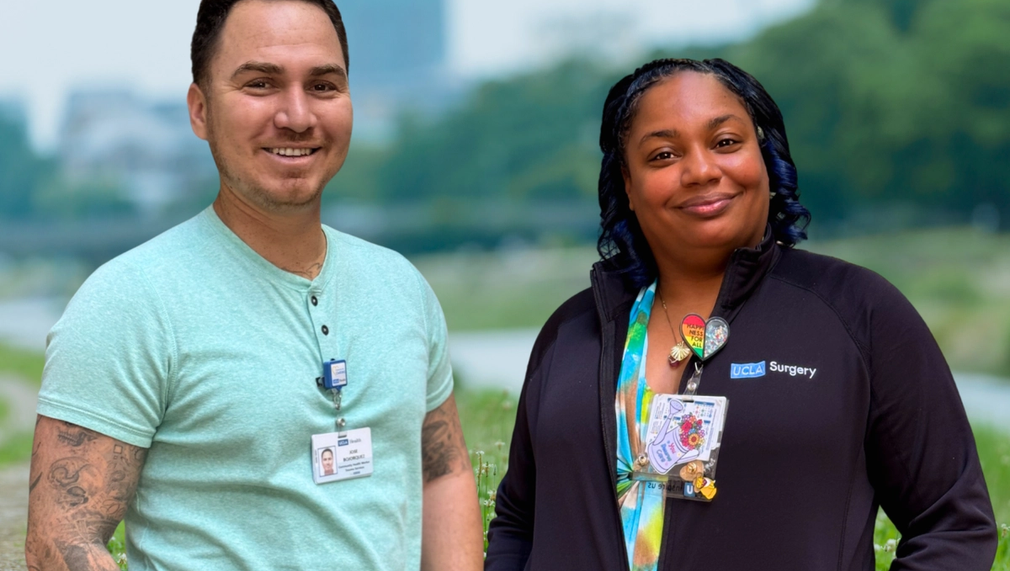Whole Person HEaLing Starts Here
The UCLA HEaL (Healing, Empowering, and Liberating) Trauma Program connects survivors of traumatic injury to a trauma-informed care team that begins in the hospital and continues into the community. We address social drivers of health—like housing, food, and mental health—through trauma-informed support from Community Health Workers (CHWs), a clinic psychologist fellow, and care team partners. We plan to expand access and build an evaluation model—advancing health equity across Los Angeles.

What is the primary issue area that your application will impact?
Health care access
In which areas of Los Angeles will you be directly working?
County of Los Angeles (select only if your project has a countywide benefit) City of Los Angeles (select only if your project has a citywide benefit) Other
In what stage of innovation is this project, program, or initiative?
Expand existing project, program, or initiative (expanding and continuing ongoing, successful work)
What is your understanding of the issue that you are seeking to address?
Each year, Ronald Regan UCLA Medical Center (RRUMC) treats over 1,800 critically injured patients—56% are at risk for mental health complications. These risks are often shaped by negative social drivers of health, including housing instability, limited access to employment, or justice system involvement. Trauma can magnify these challenges and delay healing. Yet most trauma systems still focus only on physical injury. HEaL fills this gap through early mental health screening, bedside engagement, coordinated post-discharge support, and continued outpatient care as patients navigate recovery in their communities. Our PTSD outreach system identifies high-risk patients and connects them to psychological care from a trauma-specific provider—the same provider they worked with during their hospital stay. HEaL demonstrates what trauma recovery should be: accessible, integrated, and designed to meet the complex needs of survivors across both clinical and community settings.
Describe the project, program, or initiative this grant will support to address the issue.
The HEaL Trauma Program is a hospital- and community-based initiative that ensures survivors of traumatic injury are connected to care that continues after discharge. This grant will expand our post-discharge PTSD screening and referral system, linking high-risk patients to outpatient care with the same trauma psychologist they met during their hospital stay. This continuity of care removes administrative and insurance-related barriers, making mental health access timely, trauma-informed, and equitable.
Our CHWs provide culturally responsive support with housing, insurance, care navigation, and unmet social needs. HEaL advances health care access by integrating medical and mental health services with wraparound community support. We also contribute to community safety by helping patients regain stability and avoid preventable harm through sustained care and trusted relationships. We plan to conduct qualitative interviews with HEaL clients to evaluate impact. Participants will receive support from our psychology fellow and stipends to honor their time and emotional labor.
HEaL’s model is working—but current budget cuts and a cautious health system funding climate threaten our ability to grow. This evaluation period is critical to building the data needed for long-term institutional support. Funding will help us strengthen access, deepen impact, and prove what equitable trauma recovery can look like.
Describe how Los Angeles County will be different if your work is successful.
Los Angeles will be a place where trauma survivors are not discharged into isolation, but into coordinated care that supports healing, stability, and self-advocacy. HEaL dismantles systemic inequities by ensuring all survivors—regardless of background—can access trauma-informed care, critical resources, and tools to advocate for their recovery. Through our PTSD screening and referral system, survivors access timely mental health care from trusted in-house providers.
Our HEaL team helps patients navigate complex medical, mental health, and social systems that often feel impossible to access after trauma. This approach meets immediate needs, supports long-term recovery, reduces avoidable ED visits, and promotes community stability.
With a formal evaluation, we aim to use outcomes to advocate for health system investment and position HEaL as a sustainable, institutional model of care. HEaL is more than a program—it’s a blueprint for transforming how cities care for people after trauma.
Approximately how many people will be impacted by this project, program, or initiative?
Direct Impact: 540
Indirect Impact: 2,300